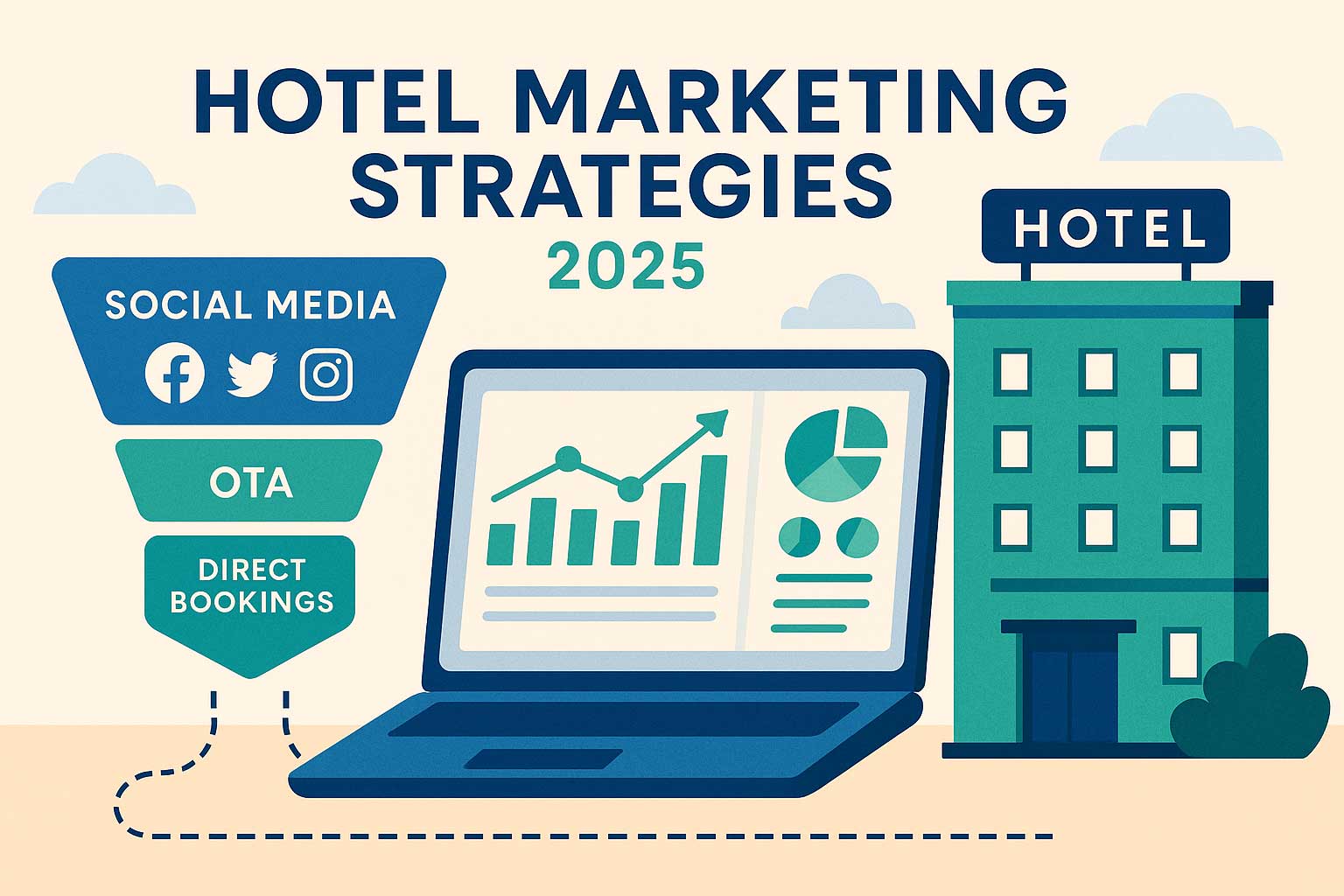9 Main Hotel Guest Types and 7 Ways to Enhance Their Experience
Aug 12, 2025
 Mika Takahashi
Mika TakahashiPopular Categories
Hotel Technology & InnovationHotel Operations OptimizationDigital MarketingIndustry TrendsRevenue ManagementHospitality Industry
Popular Categories
Trending Post

Hotel Walk Letter Template: Professional Guest Communication

Online Travel Agents: What They Are and How They Work

Hotel Security Systems: Modern Protection Solutions

Hotel Advertising: Complete Guide to Boost Bookings and Revenue

25 Hotel Marketing Strategy Ideas for 2025: Complete Guide

AI Reservation Agent: Revolutionizing Hotel Booking and Guest Experience

PMS Communication: Streamlining Property Management Through Effective Guest Messaging
Table of contents
In today's bustling hospitality world, hotels that truly succeed do more than just offer a place to sleep—they carefully identify and cater to distinct guest personas to boost both revenue and guest happiness. Knowing the different types of hotel guests who walk through your doors isn't simply about excellent service; it's about fine-tuning every part of your operation, from pricing strategies to what amenities you offer.
Top-performing hotels understand that their guests aren't all cut from the same cloth. Each type of guest arrives with their own expectations, spending habits, and booking patterns—all of which have a direct impact on your bottom line. Whether you're running an independent boutique or working within a major hotel chain, recognizing and serving your ideal guest segments can revolutionize your revenue management and elevate guest satisfaction.
This guide dives deep into the varied world of hotel guest types—from busy business travelers focused on efficiency to wellness travelers who prioritize spa treatments and healthy dining options. We'll explore how understanding these hotel guest personas can help you customize your marketing, optimize amenities, and ultimately attract more profitable bookings.
Why Understanding Hotel Guest Types Matters

Pinpointing your guest personas lets you craft targeted hotel marketing campaigns and revenue strategies that make a real difference to your property's profitability. When you truly understand who your typical guest is, you can create messaging that speaks directly to their unique needs and challenges—leading to higher conversion rates and more direct bookings.
Different hotel guest types have their own spending habits, booking behaviors, and service expectations, all of which shape your operational choices. For example, business travelers often book last-minute through corporate channels and value convenience over cost, while budget-conscious guests plan months ahead and shop around for the best deals. These distinct behaviors call for tailored approaches to pricing, distribution, and service delivery.
By customizing amenities and services for specific guest groups, you not only boost guest satisfaction but also encourage repeat visits. A hotel that caters thoughtfully to family travelers with babysitting services and family friendly amenities will likely see higher satisfaction scores than one that uses a one-size-fits-all approach. Similarly, understanding luxury travelers’ desires for customized room service and private tours can help your property outperform competitors in both revenue and reviews.
Knowing your ideal guest profile also helps you fine-tune pricing and distribution. If your most profitable guests are business travelers booking through corporate platforms, it makes sense to invest more in nurturing those relationships rather than competing purely on price via online travel agencies. This focused strategy often results in higher average daily rates and improved profit margins.
Segmenting your guests opens doors to personalized communication and upselling throughout their stay. From pre-arrival emails showcasing relevant amenities to in-house offers for spa treatments or local sightseeing tours, understanding hotel guest types allows you to present the right offer to the right guest at just the right moment. This personal touch not only increases ancillary revenue but also enriches the overall guest experience.
Business Travelers

Business travelers—those corporate guests who value efficiency, convenience, and productivity—are among the most valuable hotel guest types. Often backed by company budgets, they tend to be less price-sensitive and prioritize maintaining their work routines even while away from their physical office space.
Today’s business traveler expects fast, reliable internet for video calls, business centers with printing and scanning capabilities, meeting rooms ready for client presentations, and 24/7 room service to accommodate irregular schedules. They appreciate seamless tech features like mobile check-in, in-room charging stations, and smart controls that help them stay productive without interruption.
Location is key for business travelers who want easy access to business districts, airports, and conference venues. Hotels situated in city centers or near major corporate hubs often command premium rates from this segment.
These guests typically book through corporate travel programs and are loyal to hotel loyalty programs offered by major chains. Their streamlined booking process means hotels must maintain strong connections with travel management companies.
Business travelers also value express check-in/out, same-day laundry services, and ample charging stations in public areas. Since they often work odd hours, having services available beyond the usual times can make a big difference. Hotels that cater well to these needs often enjoy higher satisfaction scores and repeat bookings from this lucrative group.
The growing trend of “bleisure” travel—combining business and leisure—presents additional opportunities. Many business travelers extend their trips to enjoy local culture or recreational activities, especially over weekends. Hotels can capitalize by offering packages that blend business-friendly amenities with access to local restaurants, coffee shops, and cultural experiences.
Leisure Travelers
Leisure travelers are vacationers seeking relaxation, entertainment, and authentic local experiences. They often represent the largest guest segment for resorts and destination hotels. Unlike business travelers, leisure guests prioritize value and memorable experiences over pure efficiency.
They usually travel with partners, family, or friends, enjoy longer stays, and plan trips around holidays and school breaks. Their booking patterns create predictable demand peaks that hotels can leverage for revenue management.
Leisure travelers choose accommodations based on proximity to local attractions, beaches, shopping areas, and restaurants. They appreciate amenities like pools, spa treatments, concierge services offering local recommendations, and recreational facilities. Many are willing to pay extra for hotels that offer rich leisure experiences, making them prime candidates for upselling spa treatments and activity packages.
These guests often research extensively across multiple platforms before booking and tend to be more price-sensitive, booking well in advance to secure the best deals. Hotels can capture more direct bookings by offering exclusive packages and rate guarantees on their websites.
Leisure travelers also love immersing themselves in local culture. Properties that partner with local businesses to offer guided tours or cultural activities often see higher guest satisfaction and increased ancillary revenue.
Family Travelers

Families traveling across generations—parents, kids, grandparents—bring unique opportunities and challenges. This growing segment is fueled by rising disposable incomes and the desire for shared experiences.
Family travelers look for accommodations that cater to their needs: connecting hotel rooms, cribs, high chairs, and child-proofed spaces that ensure safety and comfort for all ages. These practical features often influence booking decisions more than luxury amenities.
Hotels that offer family friendly amenities such as kids’ clubs, playgrounds, supervised activities, and entertainment programs not only attract more family bookings but can also charge premium rates. Many families especially value structured activities during school holidays.
Budget-conscious families often plan detailed itineraries focused on educational and entertainment value. Offering package deals that bundle meals, activities, and attraction tickets helps simplify budgeting and avoid surprises.
Essential services include babysitting, family meal packages with kid-friendly options, and discount vouchers for local family attractions like zoos or aquariums. Hotels partnering with these attractions often enjoy increased bookings and higher guest satisfaction.
Family travel demand aligns with school calendars, peaking during summer, winter, and spring breaks. Hotels can optimize revenue by adjusting pricing and staffing accordingly, while offering attractive packages during shoulder seasons to extend the family travel window.
Digital Nomads
The rise of remote work has given birth to a fast-growing segment: digital nomads. These guests blend work and travel, seeking location independence while maintaining productivity. They offer hotels opportunities to boost extended-stay bookings and fill rooms during off-peak times.
Digital nomads require high-speed, reliable internet capable of supporting video calls and cloud work. They appreciate co working spaces or business-friendly common areas and expect ample power outlets in their rooms.
Community matters to digital nomads. They look for social spaces where they can network with fellow remote workers and travelers, as well as events and meetups that help reduce isolation. Hotels fostering vibrant communal atmospheres often attract longer stays and positive word-of-mouth.
Typically, digital nomads book extended stays—weeks or months—often negotiating better rates due to longer commitments and lower daily service needs. Though budget-conscious, they tend to spend more on local dining, activities, and experiences than traditional business travelers.
Hotels that partner with local co working spaces, provide info on business meetups, and offer access to local culture stand out to this segment. Balancing professional amenities with opportunities to engage with the local area helps digital nomads maintain work-life harmony.
Luxury Travelers

Luxury travelers, typically between 30 and 60 years old, seek exclusive, premium experiences and represent one of the most profitable hotel guest types. They prioritize exceptional service, unique experiences, and personalized attention over price.
These guests expect private tours granting exclusive access to destinations, fine dining often featuring local cuisine, and premium amenities beyond standard hotel offerings. They measure value by quality and exclusivity, making them ideal targets for high-margin services like spa treatments and private dining.
Luxury travelers often travel in couples or small groups with significant discretionary spending power, enabling hotels to maximize revenue through ancillary services. Their booking process may involve luxury travel advisors, direct reservations with concierge services, and premium loyalty programs.
Privacy and personalized concierge services are paramount. Luxury guests appreciate seamless arrival experiences, customized dining, and exclusive access to local attractions. Hotels serving this segment must invest in staff training, premium amenities, and partnerships with luxury providers to consistently exceed expectations.
Budget Travelers
Budget conscious guests prioritize value and essential comforts over luxury. This diverse group includes backpackers, students, young professionals, and families seeking affordable accommodations that meet basic needs.
Budget travelers often book through economy sites, hostels, and budget hotel chains. They extensively compare prices and reviews to ensure maximum value. Providing clean, safe rooms with free wifi, secure storage, and complimentary breakfast can sway their booking decisions.
These guests appreciate local recommendations for affordable dining, local attractions, and tips to stretch their travel budget. Hotels can add value by partnering with budget-friendly local businesses to offer discounts and insider tips.
Many budget travelers seek authentic local experiences, favoring accommodations that provide access to local communities and culture. Properties facilitating these connections often earn positive reviews and repeat bookings.
Wellness Travelers

Health and wellness travelers focus on physical, mental, and spiritual well-being. This fast-growing segment seeks accommodations and experiences that support their wellness goals, creating opportunities for hotels to offer specialized services and premium packages.
Wellness guests expect spa facilities, fitness centers, yoga and meditation classes, and healthy dining options aligned with their lifestyle. They’re willing to pay more for authentic wellness experiences and genuine commitment to health, beyond superficial amenities.
Often traveling solo or in small groups, wellness travelers look for retreats, spa programs, and health-focused activities rather than traditional sightseeing. They value organic, locally sourced menus, quiet meditation spaces, access to nature, and eco-friendly practices.
Booking often happens through wellness-focused platforms and communities, with careful research to ensure alignment with personal health goals.
Successful wellness properties integrate accommodation with wellness activities—multi-day retreats, personalized consultations, therapeutic treatments, and educational programs—that justify premium pricing.
Generation-Specific Travelers
Baby Boomers (Born 1946-1964)
Boomers, often retired or semi-retired, travel with higher budgets and longer stays. They value comfort, cultural experiences, and traditional hospitality. With decades of travel behind them, they have clear service expectations.
Boomers prefer accessible accommodations, guided tours with educational value, and traditional communication like phone bookings and printed materials. They appreciate human interaction and personalized service.
Loyalty programs offering recognition and benefits appeal strongly to this group. Boomers seek authentic cultural experiences, local history tours, and relaxation amenities supporting comfortable travel as they age.
Millennials (Born 1981-1996)
Millennial travelers combine business and leisure travel and prioritize authentic, social media-worthy experiences. They expect mobile check-in, Instagrammable amenities, and genuine local culture rather than tourist traps.
They value sustainability, unique experiences, and social responsibility, booking mainly through mobile apps and peer recommendations.
Generation Z (Born 1997-2012)
Gen Z travelers are budget-conscious yet crave authentic experiences. They demand fast wifi, social spaces, charging stations, and safety information as often less experienced travelers.
Heavily influenced by social media and influencers, they prefer hostels and budget hotels with community atmospheres that foster social interaction and cultural exchange.
Special Interest Travelers
Event attendees—conference guests, wedding parties, corporate groups—need convenient event access, group check-in, business center support, and flexible dining. Hotels that cater well to these needs capture significant group business.
Green travelers look for eco-friendly accommodations with verifiable sustainability practices. Demonstrating genuine environmental commitment attracts this growing segment.
Solo travelers seek safety, social opportunities, and single-friendly amenities. Properties addressing these needs tap into a growing market.
Extended stay guests require home-like amenities such as kitchenettes and laundry, often booking weekly or monthly. They offer hotels steady revenue streams.
VIP guests—celebrities, dignitaries—demand privacy, high-level security, and personalized services. Though few, they generate significant revenue and publicity.
How to Identify Your Hotel’s Guest Types
Analyzing your property management system data for booking patterns, demographics, length of stay, and spending habits is key to understanding your guest mix and growth opportunities. Look at seasonal trends, booking sources, and guest behavior to inform your target markets and service offerings.
Website analytics and social media insights reveal visitor behavior and preferences, helping tailor marketing and amenities.
Guest surveys and review analysis provide qualitative feedback on satisfaction and unmet needs.
Track booking channels—OTAs, direct bookings, corporate programs—to understand how guests find you and optimize distribution.
Monitor seasonal demand by guest type to adjust pricing, staffing, and marketing.
Collect relevant demographic and preference data during booking without creating friction to improve segmentation.
Implementing Guest Type Strategies
Create targeted marketing campaigns tailored to each guest persona’s behaviors and preferences.
Customize amenities and services to meet guest expectations while managing costs.
Train staff to recognize and serve different guest types, enhancing personalization and upselling.
Optimize pricing and packages based on guest price sensitivity and booking habits.
Use guest data to prioritize property improvements with the highest ROI.
Continuously monitor and adapt strategies as travel trends evolve.
Success depends on consistent execution across departments, ensuring every guest interaction reflects understanding of their unique needs.
Conclusion
Understanding hotel guest types goes beyond better service—it builds a competitive edge that drives revenue and operational success. Hotels that identify and cater to their ideal guests enjoy higher satisfaction, improved daily rates, and more direct bookings.
As travel patterns shift and new demographics emerge, staying ahead by analyzing guest data and adapting strategies will secure your property’s profitable future.
Start today by analyzing your guest data to pinpoint your most valuable segments and craft strategies that turn occasional visitors into loyal customers. The investment in mastering hotel guest types pays off through smarter revenue management, focused marketing, and unforgettable guest experiences that set your property apart.
